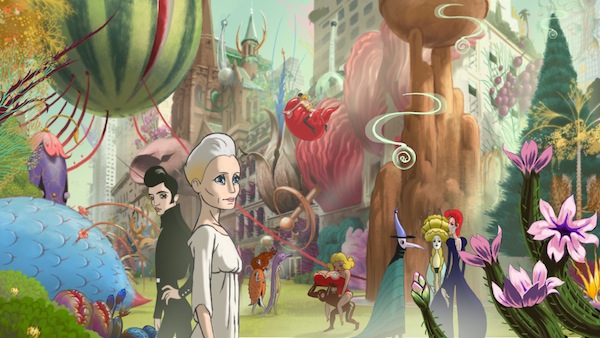You have no items in your cart. Want to get some nice things?
Go shoppingAri Folman’s psychedelic follow-up to the critically lauded Waltz With Bashir is one hell of a trip.
Amidst the polychromatic, dreamlike animation that makes up the second half of Ari Folman’s psychedelic sci-fi, The Congress, Robin Wright (the character, played by and based on the actress) is offered a pill. Much like the choice Morpheus affords Neo in The Matrix, this pill represents the opportunity to peel back the surrounding falsehoods, and experience the world as it truly is. This, however, is an unreality built not on the enslavement of humanity by robotic overlords but on an addiction to self-gratification and the desire to become anyone we want at any time.
The very nature of identity becomes malleable in this hallucinatory zone, which shines a cautionary light on a modern cultural preoccupation not with celebrity as a concept, but with celebrities themselves. Entwined with that train of thought is another – the internet’s ever increasing role in the notion of identity and how we are able to craft it ourselves. During our protagonist’s time in this zone, it expands from the hedonistic setting for The Futurological Congress (a conference taking the name of the Stanislaw Lem novel that also provides loose inspiration) to the entire world.
But let us jump back to the beginning of this bold journey down the rabbit hole, out of the animation, and to Robin Wright. Here she plays a fictionalised version of herself among the various layers of reality that ultimately comprise Folman’s labyrinthine construction. After the earlier stellar successes of her career – The Princess Bride, Forrest Gump – she has nosedived into oblivion due to a lot of, as her agent played by Harvey Keitel puts it, “bad choices”. However, shyster studio executive, Jeff (Danny Huston) offers her one final contract.
This will see her digitally scanned and her image re-used by the studio as and when they like but she must agree never to act again. Robin is not at all keen on this idea but agrees, and when the action jumps forward decades to the aforementioned Futurological Congress, she is still adorning the silver screen as in her youth – albeit playing the kick-ass femme fatale of Rebel Robot Robin. The Congress itself is in the chemically created animation zone and Robin is the guest of honour for she will be the first star that clamouring fans will be able to consume in an all-new high.
Things take a further turn in a psychotropic cure for what ails humanity; the world – or humanity’s perception of it – is now engulfed by the animation zone that allows people to take the form of anything and anyone that they like. Robin, however, just wants to find her son, Aaron (Kodi Smit-McPhee) and seeks the help of the man responsible for animating her digital movie-star self, Dylan (Jon Hamm). As if the levels of reflexivity within the film were not enough, it is worth noting that Wright has herself appeared in Robert Zemeckis’ Beowulf and A Christmas Carol, where this exact idea – of digitising an actor – has in fact happened.
Its first half, the live action part, comprises a heavy indictment of modern Hollywood, imagining on the screen a dystopian – but all too possible – future in which the system’s endemic marginalisation of human performance is pushed to its furthest extreme. Through our desperate obsessions with celebrity – taking a stance along the same veins as Brandon Cronenberg’s recent Antiviral – it then morphs into a fanciful trip through an imagined world examining our own desire to escape both the banality of everyday life and our own, apparently mundane, personas.
It does all this through a thrilling and intoxicating romp bursting at the seams with cinematic and pop-cultural references (look out for the cameos for the only other surviving movie star along with Robin). Despite all of the bravado, and the metaphysical examinations of society and the industry in which the film itself had to be made, it is also centred by a poignant personal journey – Wright’s race through this mystifying kaleidoscopic dreamworld in search of her son who she has unwittingly abandoned.
Whether or not she finds him is left heart-breakingly open ended and provides a much more moving denouement than might have been expected from the preceding two hours. It’s a poignant conclusion to a witty, ambitious and stunningly drawn thrill ride. If its style and its meta-commentary don’t engross and beguile, it is easy to see how audiences could find The Congress an ambitious failure. That would be a real shame, though, as it is rich, visually stunning, conceptual science fiction and one hell of a trip.
About Ben Nicholson
A compulsive cinephile, Ben fell in love with film through repeated viewings of Michael Jackson being transformed into a werewolf behind the scenes of John Landis' seminal video for Thriller. This passion has manifested itself in his consumption of movies and the enjoyment derived from reading, discussion and writing about cinema which can all be found on New Urbanite. His favourite films include The Third Man, In The Mood For Love, Badlands, 3 Iron, Casablanca, Ran, and Last Year in Marienbad - to name but a few.





